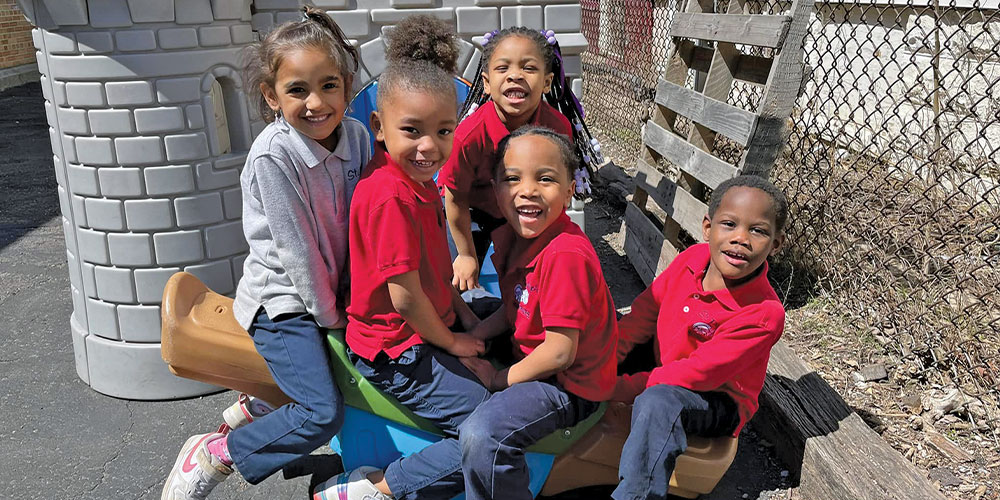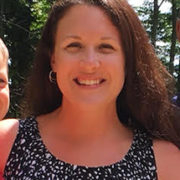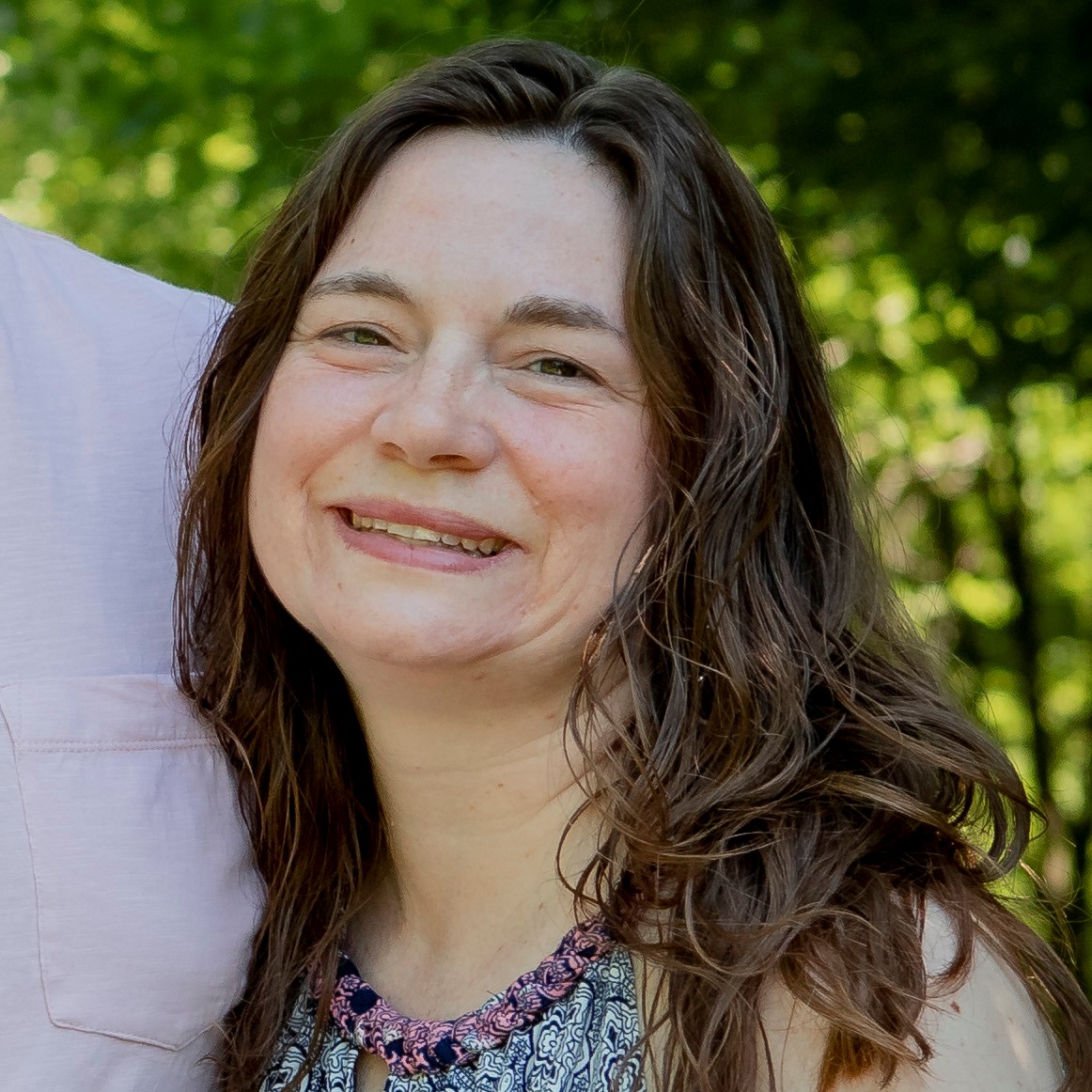 |
This might sound odd, but I’m usually more concerned about how my kids are doing interpersonally in school than how they are doing academically. Don’t get me wrong. I’m all for reading, writing, and arithmetic, but I think that so much growth in how we navigate relationships takes place in school. These are character-building lessons. So back-to-school season is a great time to consider how we are equipping our kids to be good friends so that they can reflect those attributes of a good friend to their classmates. Read on to see what pointers two veteran teachers have for us.
— Nicole Balza

“You have a friend in me.” “I’ll be there for you.” “Friends forever.” “Besties.” These quotes about friendship are familiar to many. They quickly make a connection in our brains to a story, people, characters, maybe even a memory. Most adults could quickly rattle off a list of things that define friendship for them. We know what it takes to be a good friend, and we also know that, like every relationship, maintaining those friendships takes effort. Good friends learn from each other, help each other, share, compliment each other, and the list goes on.
So how do we help young children learn to be good friends? As with many concepts and skills, teaching friendship is not a one-and-done lesson. It is ongoing. It is an integral part of a young child’s social-emotional development, and it continues to grow and develop as our children do.
My kindergarten students practice these skills frequently in the classroom. We talk about what good friends do. We model and role-play social situations. We discuss what our friends do that make us feel happy and what we can do to make others feel good. This is all part of a bigger process in which we work to cultivate empathy, compassion, and kindness in our children.
When I ask my students to share what they can do to be a good friend, they will often respond with answers like “I can help,” “Check on others if they are hurt,” or “Say kind words.” These ongoing conversations are a key part in teaching our children about friendship.
Of course, we have greater motivation as well. Growing up, my dad had this mantra: “Nelsons are nice to everyone,” and he meant it. It wasn’t a command or a rule, though. It was a way of being that he modeled for us and reminded us of regularly, and it stuck with me. It’s just who we are.
Of course as sinners we can never get it right all the time, but as the guardians of Christ’s little lambs, we can keep the conversations going. We can have the discussions, we can read the books, and we can model the love we have in Christ to those around us. In these conversations it’s valuable to help our children understand that it’s so much more than being a friend to those we know, care about, and spend time with. It’s about showing kindness, love, and compassion to all, the way Jesus did. It is because of his immense sacrificial love for us that we are even capable of loving others.
The apostle John wrote, “We love because he first loved us” (1 John 4:19). This goes beyond Jesus being a good example. He is perfect love, and he demonstrated that perfect love, that perfect friendship, by his death on the cross. Through that redemption in Christ Jesus and in the waters of holy Baptism, we are made righteous. Righteous people do righteous things. We are loved, saved, and made new, and as new creations in Christ, we are called and fully equipped to love one another, to be a good friend.
This is the message to share with your little one: We are saved, loved, called, and equipped. In Christ, it’s just who we are.
Amanda Berg
Note: Kindergartners pictured above were in Amanda Berg’s class at St. Philip, Milwaukee, Wis., during the 2021–22 school year.
• • • • • • • • • • • • • • • • • • • • • • • • • • • • • • • • • • • • • • • • • • • • • • • • •
As children look forward to going back to school, they are often thinking about seeing friends again and how exciting it is to talk and play with kids their own age. However, as the year begins and parents ask their children about school and how it’s going, the problems that kids bring up are often related to friendships and conflict with their peers.
As a first-grade teacher, one of the things that I notice is how quickly students “quit” their friendships. One child says or does something that another doesn’t like or agree with and quickly a child declares, “I’m not your friend anymore.”
Knowing that our sinful nature often leads us to avoid or cause conflict and then walk away from people who upset us or make us uncomfortable, we must arm ourselves and our children with the sword of the Spirit, God’s Word. With the truth of God’s Word and the Holy Spirit working in our hearts, we can love those we disagree with and lean into conflict, working through it.
But how do we begin talking to young children about building friendships? Relationships and conflict are hard for adults as well as children! It’s important to begin with discussing the natural state we all share: We are all sinners in need of Jesus our Savior.
That truth means that we should expect conflict in our relationships because the people around us are sometimes going to make poor choices, just like we do. If we expect that everyone we interact with is going to need our forgiveness at times, it does not come as such a surprise when they do. Then we can lean into the conflict with love and forgiveness instead of running away. Colossians 3:13 says, “Bear with each other and forgive one another if any of you has a grievance against someone. Forgive as the Lord forgave you.” We also should be ready to say, “I’m sorry,” when we need their forgiveness.
If we practice responding with love and forgiveness instead of meeting sin with sin, our relationships grow and improve. Practicing this with family members is an excellent way to set children up for success with their friends.
A good friend forgives, and a good friend also encourages. First Thessalonians 5:11 says, “Encourage one another and build each other up, just as in fact you are doing.” Teaching and showing our children how to look for ways to encourage those around them is a wonderful way to build the kingdom of God.
Our sinful nature wants us to compete with and compare ourselves with others, especially our peers, but God tells us to encourage and love one another. If our children learn to walk alongside one another with encouragement, forgiveness, and love, think of the beautiful friendships our children will have.
Growing friendships is not easy, but through them we gain the privilege of sharing Jesus and his grace. That is the most important blessing of friendship!
Rachel Blum
Author: Multiple authors
Volume 109, Number 09
Issue: September 2022
- Parent conversations: How can parents and kids manage stress?
- Parent conversations: What do your prayers for your children include?
- Parent conversations: How do we resist making our parenting law-based?
- Parent conversations: What Bible passages do you turn to most as a parent?
- Parent conversations: How can we help kids develop positive, healthy habits?
- Parent conversations: What tactics do you use to encourage children to tackle difficult tasks?
- Parent conversations: How can we model good listening skills for our kids?
- Parent conversations: How do we help our kids move on from mistakes?
- Parent conversations: How can we instill gratitude in our children?
- Parent conversations: How can parents find the balance between being too restrictive and too permissive?
- Parent conversations: How can we teach kids to be good friends?
- Parent conversations: What life skills will help young people as they transition to adulthood?
- Parent conversations: How do we discuss death with our children?
- Parent conversations: What does it look like for a father to be a strong Christian leader?
- Parent conversations: How can we help young adults stay engaged in the church?
- Parent conversations: What do parents need to know about video games?
- Parent conversations: How do parents not let worry get the best of them?
- Parent conversations: How do we teach our kids to value all people?
- Parent conversations: When parenting philosophies differ
- Parent conversations: How can we help today’s overwhelmed teens?
- Parent conversations: How can parents maintain a healthy marriage?
- Parent conversations: You might be a Lutheran parent if . . .
- Parent conversations: Parenting post–high school: What is a parent’s role?
- Parent conversations: How can families use the hymnal in their worship life at home?
- Parent conversations: What should Christian parents teach their children about gender?
- Parent conversations: What is vocation? How does it apply to parenting?
- Parent conversations: Why do siblings fight? How should I react when they are fighting?
- Parent conversations: How do we teach children resilience?
- Parent conversations: How do I approach vaccines as a Christian parent?
- Parent conversations: How can I explain the Sixth Commandment to a young child?
- Parent conversations: How can I help my child have an optimistic outlook?
- Parent conversations: What if we can’t follow our Christmas traditions this year?
- Parent conversations: What are ways to foster a rich prayer life in children?
- Parent conversations: How can I let the gospel shine as I parent?
- Parent conversations: How should I handle a child’s separation anxiety?
- Parent conversations: How should families prepare to go back to school?
- Parent conversations: How does a teen’s brain work?
- Parent conversations: How much should I monitor my child online?
- Parent conversations: How can parents reassure children during an uncertain time?
- Parent conversations: How can I stay calm when my child is out of control?
- Parent conversations: Should I give something up for Lent?
- Parent conversations: How can I keep my child engaged in attending church?
- Parent conversations: How can we help a stressed-out kid?
- Parent conversations: How can we nurture a proper view of “stuff”?
- Parent conversations: How involved should parents be in a child’s homework?
- Heart to heart: Parent conversations: Are we modeling kindness for our children?
- Heart to heart: Parent conversations: What’s the best parenting advice you’ve received or given?
- Heart to heart: Parent conversations: How should we handle it when people undermine our parenting decisions?
- Parent conversations: How can we prepare children for summer camp?
- Heart to heart: Parent conversations: What’s a parent’s role as a child dates?
- Heart to heart: Parent conversations: How do parents find contentment?
- Heart to heart: Parent conversations: How can we help a family with a sick parent?
- Heart to heart: Parent conversations: How can parents model healthy cell phone use?
- Parent conversations: How can we protect kids without scaring them?
- Parent conversations: What does your family’s bedtime routine look like?
- Parent conversations: What do I need to consider before I give my child a cell phone?
- Parent conversations: How can we teach gentleness and strength at the same time?
- Parent conversations: What should we do when our children grow silent?
- Parent conversations: What should we teach our children about the Reformation?
- Parent conversations: Do we want our children to be leaders or followers?
- Parent conversations: How does a parent’s role change over time?
- Parent conversations: How should I handle a disagreement with my child’s teacher?
- Parent conversations: What are the building blocks of a strong parent/child relationship?
- Parent conversations: What is our goal as parents?
- Parent conversations: What Christmas traditions do you cherish in your family?
- Parent conversations: How can we raise a generation that cherishes life?
- Parent conversations: What are the best Bible story books for family devotions?
- Parent conversations: Why should children obey their parents?







